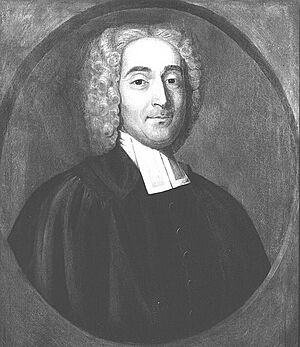Elisha Williams facts for kids
Quick facts for kids
Elisha Williams
|
|
|---|---|

Portrait of Rev. Elisha Williams, fourth Rector of Yale College
|
|
| 4th Rector of Yale University | |
| In office 1726–1739 |
|
| Preceded by | Timothy Cutler |
| Succeeded by | Thomas Clap |
| Personal details | |
| Born | August 26, 1694 Hatfield, Massachusetts |
| Died | July 24, 1755 (aged 60) Wethersfield, Connecticut |
| Signature | |
Elisha Williams (born August 26, 1694 – died July 24, 1755) was an important person in early American history. He was a minister, a lawmaker, a soldier, and a judge. He is best known for being the fourth leader, or "Rector," of Yale College from 1726 to 1739.
Contents
The Early Life of Elisha Williams
Elisha Williams was born in Hatfield, Massachusetts. His father, William Williams, was also a minister. Elisha went to Harvard College and graduated when he was just 17 years old in 1711.
In 1714, he married Eunice Chester. They had seven children, but only two lived longer than him. After getting married, he studied law. He became a member of the Connecticut legislature, which is like a state parliament, representing Wethersfield for five sessions, starting in 1717.
Elisha Williams and Yale College
Elisha Williams also worked as a tutor in Wethersfield. This was for Yale students who refused to move to New Haven, Connecticut between 1716 and 1719. He even tried to make this group of students part of Harvard, but Harvard said no.
After Yale College was reunited in New Haven, Elisha Williams stayed in Wethersfield. He studied to become a minister with his father and was ordained in 1722. He served the church in Wethersfield until 1726. That year, he became the fourth Rector of Yale College, a role he held for 13 years.
He took over Yale during a difficult time. Before him, some Yale leaders and ministers had started teaching newer ideas. In 1722, these men decided to leave the Puritan Congregationalist church and join the Church of England. This event was called the "Great Apostasy" by some.
Yale's leaders fired the Rector and a tutor involved in this. They looked for a new Rector who would follow the traditional Puritan beliefs. After six other people turned down the job, Williams accepted it in 1726. His main goal for his 13 years as Rector was to bring back the older Puritan teachings at Yale.
After Yale: Politics and Military Service
Elisha Williams resigned as Yale's Rector in 1739. He said it was for health reasons, but he likely wanted to get back into politics. He immediately became a member of the Connecticut legislature again. He served for 22 sessions between 1740 and 1754. He was even chosen as the Speaker of the House five times. He also served as a judge on the Superior Court from 1740 to 1743.
In the early 1740s, he was influenced by a religious movement called the Great Awakening. He became a "New Light," which was a group that supported the new religious ideas. This change might have been why he wasn't reappointed to the supreme court by the "Old Light" dominated Assembly.
Williams then changed careers again and became a Colonel in the Militia. He served as a Chaplain in a military expedition against Cape Breton in 1745. Later, he completely left his role as a minister and took military command of a thousand men. These men were gathered for a mission to Canada. When they weren't paid, Williams was sent to England to ask for their pay.
While he was in England, his first wife, Eunice, died. He then married Elizabeth Scott. On his way back home, he almost got shipwrecked and spent several months in Antigua before finally reaching Connecticut.
In 1754, he was a delegate to the Albany Congress, an important meeting of colonial leaders.
Elisha Williams died in Wethersfield, Connecticut and is buried there. His widow, Elizabeth, later married William Smith in 1761.
Writings by Elisha Williams
Elisha Williams wrote several religious works during his lifetime:
- Divine grace illustrious, in the salvation of sinner – published in 1727.
- Death the advantage of the godly. – published in 1728.
A famous pamphlet called Essential rights and liberties of Protestants (1744) was often thought to be written by Williams. However, the full title of the pamphlet shows the author was from Massachusetts, not Connecticut where Williams lived. Historians now believe it was likely written by Thomas Cushing, who was a classmate of Williams at Harvard.
| Academic offices | ||
|---|---|---|
| Preceded by Timothy Cutler |
Rector of Yale College 1726–1739 |
Succeeded by Thomas Clap |
 | Aaron Henry |
 | T. R. M. Howard |
 | Jesse Jackson |

